Consultation hours
The following consultation hours with specific questions are offered by the University Heart Center Basel:
Cardiology outpatient clinic
In the cardiology outpatient clinic (Wednesday afternoons, Friday mornings and afternoons), consultations are held in two different areas:
- Follow-up examinations after a heart attack; after heart surgery on the coronary vessels (bypass) or on the heart valves
- General investigations of heart problems such as chest pain, extra beats, difficult to control blood pressure, to name just a few symptoms
As a rule, patients are referred to the consultation by their family doctor or a cardiologist who would like a second assessment.
We endeavor to carry out additional examinations only if they have not already been carried out externally recently. Wherever possible, these examinations are coordinated so that they can take place on the same half-day as the consultation.
We prepare a report for the attention of the family doctor, the referring doctor and any other doctors involved that the patient specifies. The patient always receives a copy of the report.
Clinic 2
Medical outpatient clinic on the ground floor
Petersgraben 4
4031 Basel
Phone +41 61 265 44 44

Private consultation hours
The general practitioner or a cardiologist can refer patients with a specific, complex problem directly to one of the senior physicians for a consultation. Self-referral is not possible. The name Private Consultation Hour is historical and does not depend on insurance status. Each senior doctor has his or her private consultation hour on a different half-day and usually only once a week.
We endeavor to carry out additional examinations only if they have not recently been carried out externally. Whenever possible, these examinations are coordinated so that they can take place on the same half-day as the consultation. We draw up a report for the attention of the family doctor, the referring doctor and any other doctors involved that the patient specifies. The patient always receives a copy of the report.
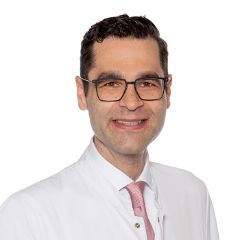
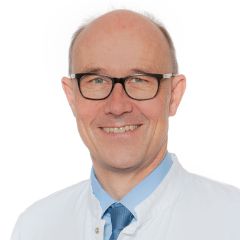
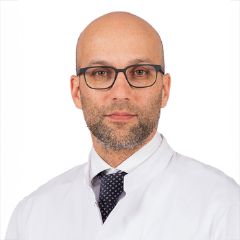


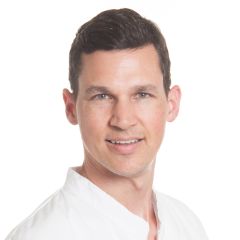
Prof. Michael Kühne
Leitender Arzt
Kardiologie
Elektrophysiologie / Vorsitz Herzzentrum
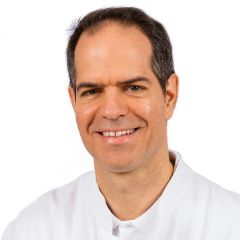
Prof. Otmar Pfister
Leitender Arzt
Kardiologie
Leiter Herzinsuffizienz, Prävention und Rehabilitation

Prof. Oliver Thomas Reuthebuch
Chefarzt a.i.
Herzchirurgie
Co-Leiter strukturelle Klappentherapie

Prof. Beat Schär
Kaderarzt/Personaloberarzt
Kardiologie
Universitäres Zentrum für Schwindel und Gleichgewichtsstörungen

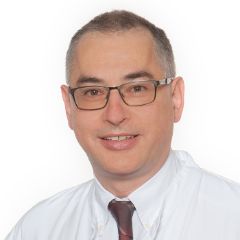
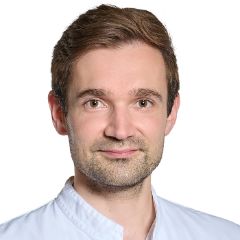
Rhythm consultation hours
The rhythm consultation takes place on Wednesday afternoons. Patients with persistent cardiac arrhythmia, fainting spells or an abnormally slow pulse are assessed on referral from their GP or a cardiologist.
Various measures such as sclerotherapy, the insertion of a pacemaker or defibrillator or specific antiarrhythmic treatment can be discussed with the specialists.
We endeavor to carry out additional examinations only if they have not already been carried out externally recently. Wherever possible, these examinations are coordinated so that they can take place on the same half-day as the consultation.
We draw up a report for the attention of the family doctor, the referring doctor and any other doctors concerned that the patient specifies. The patient always receives a copy of the report.
Clinic 2
Medical outpatient clinic on the ground floor
Petersgraben 4
4031 Basel
Phone +41 61 265 44 44

Chronic heart failure
Heart failure (cardiac insufficiency) can occur as a result of practically any heart disease. In the heart failure consultation, we assess and advise patients with heart failure of any form and severity. This includes, among other things
- Optimizing drug therapy and evaluating additional non-drug therapies (e.g. resynchronization, defibrillator therapy) for patients with symptomatic heart failure
- Evaluation of heart replacement procedures in patients with severe, therapy-resistant heart failure (ventricular assist devices, e.g. LVAD, heart transplantation)
- Prompt follow-up after hospitalization due to deterioration (decompensation) of heart failure
Consultation hours on Wednesdays (Gellertstrasse 120) and Thursday afternoons (Klinikum 2, Medizinische Poliklinik) by special arrangement. The respective location of the consultation hours will be noted on the appointment letter. Please bring the necessary documents with you (e.g. recent lab results, medical reports and current medication list).
Clinic 2
Medical outpatient clinic on the ground floor
Petersgraben 4
4031 Basel
Phone +41 61 265 44 44

Prof. Otmar Pfister
Leitender Arzt
Kardiologie
Leiter Herzinsuffizienz, Prävention und Rehabilitation
Clarification and treatment of risk factors
Cardiovascular diseases are significantly favored and promoted by so-called risk factors. These include nicotine consumption (smoking), unfavorable blood lipids and body fat distribution, diabetes, high blood pressure, lack of exercise and an unbalanced diet. In our consultation hours, we create an individual cardiovascular risk profile and work out an appropriate treatment plan with the patient.
This includes, among other things
- General risk assessment
- Clarification/therapy of elevated blood lipids, including familial blood lipid disorders
- Accompanied smoking cessation
- Drug therapy in line with guidelines
- Exercise and nutritional advice
Consultation hours at the Cardiovascular Prevention Center (Gellertstrasse 120) by special arrangement. Please bring the necessary documents with you (e.g. recent lab results, medical reports and current medication list).
Cardiovascular Prevention Center
Gellertstrasse 120
4052 Basel
Phone +41 61 556 52 98
Fax. +41 61 265 55 03

Prof. Otmar Pfister
Leitender Arzt
Kardiologie
Leiter Herzinsuffizienz, Prävention und Rehabilitation
Hypertension treatment
The interdisciplinary hypertension consultation takes place in the Medical Polyclinic.
In close cooperation with other departments of our hospital(cardiology, endocrinology / diabetology / clinical nutrition, gynecology and obstetrics, nephrology, angiology, radiology), hypertension patients and patients with cardiovascular risk factors can be clarified and treated in an interdisciplinary manner in our consultation hours. In addition to hypertension, we also focus on lipid metabolism disorders.
The hypertension consultation at the University Hospital Basel is recognized by the European Society of Hypertension as a center of excellence (ESH Hypertension Centre of Excellence).
Patients with high blood pressure and/or lipid metabolism disorders are treated in close cooperation with the referring general practitioner. The focus is on
- Comprehensive and modern diagnostics
- Diagnosis and treatment of uncomplicated and complex hypertension
- Diagnosis and treatment of therapy-resistant hypertension
- Diagnosis and treatment of secondary hypertension
- Treatment of pregnancy-associated forms of high blood pressure
- Preliminary clarification and follow-up care for interventional blood pressure treatment procedures (renal denervation)
- Second opinion
- Diagnosis and treatment of lipid metabolism disorders
Clinic 2
Medical outpatient clinic on the ground floor
Petersgraben 4
4031 Basel
Phone +41 61 265 50 05
Fax. +41 61 265 55 15
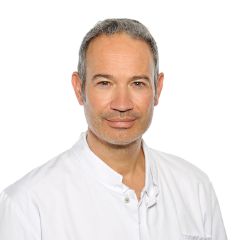
Stop smoking consultation
Smoking is still the most important risk factor for the occurrence of lung, heart, vascular and cancer diseases. Smoking causes massive damage to our health. The best and most important personal health precaution is therefore to stop smoking. However, this is easier said than done. The nicotine in cigarettes leads to physical and psychological dependence, which is why the process of quitting smoking can be difficult.
To provide you with lasting support on this path, the Medical Polyclinic offers an individual stop-smoking consultation for anyone who wants to stop smoking.
We offer the following:
- Initial consultation with assessment of smoking habits in everyday life
- Information about the various effects of tobacco and the corresponding symptoms of withdrawal
- Determination of the individual withdrawal strategy and tips and tricks when withdrawal symptoms occur
- Options for medication support
- Individual support and motivation during smoking cessation, as well as advice on preventing weight gain and strategies to prevent relapse
- Advice and information about the lung cancer screening program at the University Hospital Basel.
Further information on lung cancer screening can be found at:
Clinic 2
Medical outpatient clinic on the ground floor
Petersgraben 4
4031 Basel
Phone +41 61 265 50 05
Fax. +41 61 265 55 15

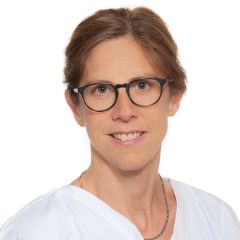
Sports cardiology/cardiac prevention
The consultation and diagnostics take place in the Cardiovascular Prevention Center (Gellertstrasse 120) of the Cardiology Department of the University Hospital Basel. The focus is on the cardiological assessment of recreational and competitive athletes.
There is close cooperation with the specialized cardiology departments such as electrophysiology, interventional cardiology, imaging, etc.
The examinations include
- echocardiography
- spiroergometry
- Lactate performance diagnostics
- Long-term ECG and blood pressure
- Laboratory testing
- Sports and training advice
- Clarification of performance intolerance
- Assessment of cardiovascular risk and advice on physical activity for athletes with heart disease
- Decisions on fitness for competition
- Resilience after special illnesses and interventions
University Hospital Basel
Gellertstrasse 120
4052 Basel
Phone +41 61 556 52 98
Fax. +41 61 265 55 03

Prof. Otmar Pfister
Leitender Arzt
Kardiologie
Leiter Herzinsuffizienz, Prävention und Rehabilitation
Congenital heart defects (GUCH)
In the consultation hour for congenital heart defects, we advise and treat patients who have already been treated for a congenital heart defect in childhood by the pediatric cardiology department, or in whom a congenital heart defect was only discovered in adulthood.
Heart problems often occur in patients with congenital heart defects in adulthood. The most common problems include arrhythmia, heart failure and heart valve inflammation. These problems are discussed and treated in collaboration with the specialists at the Heart Center (electrophysiology, heart failure).
Occasional heart operations and catheter examinations are also necessary. We work closely with the cardiac surgery and electrophysiology departments at the University Hospital Basel. In the case of more complex congenital heart defects, there is very good cooperation with the specialists at the University Hospital Zurich and the Inselspital Bern.
Consultations take place on Tuesdays and by special arrangement.
Clinic 2
Cardiology, 1st floor
Petersgraben 4
4031 Basel
Tel. +41 61 265 44 45
Fax. +41 61 265 45 98
Patients will receive details of where they can register together with the invitation. You will be asked to bring your documents with you. The medication card in particular is very important to us.
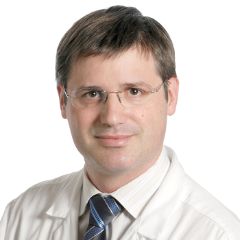
Cardio-oncology
In the consultation hours for cardio-oncology, we advise patients who are suffering from a tumor and at the same time have a cardiovascular disease or an increased cardiovascular risk.
In particular, these are
- Patients with pre-existing cardiovascular disease who have a newly diagnosed tumor disease and require cardiological co-care during tumor treatment.
- Patients with cardiovascular side effects of current or previous tumor therapies with anthracycline-containing chemotherapy, radiation or newer agents (e.g. molecular or immunotherapies).
- Long-term survivors of tumor treatments for screening and treatment of cardiovascular disease, whether or not related to tumor therapy.
We work closely with the specialists at the Tumor Center of the University Hospital Basel to ensure optimal interdisciplinary care.
Consultation hours by appointment
Clinic 2
Medical outpatient clinic on the ground floor and cardiology, 1st floor
Petersgraben 4
4031 Basel
Tel. +41 61 556 52 98
Fax. +41 61 265 45 98
Patients will receive details of where they can register together with the invitation. They are asked to bring their documents with them. The medication card in particular is very important for us.

Prof. Gabriela Kuster Pfister
Kaderärztin
Kardiologie
Kardio-Onkologie und Translationale Forschung
Women's Heart Health consultation
The women's heart consultation focuses on the prevention and treatment of heart disease in women. Cardiovascular diseases often manifest themselves differently in women than in men. There are significant differences in pathophysiology, diagnosis, treatment and disease progression. For example, coronary microvascular dysfunction, which affects the small vessels of the heart, is significantly more common in women.
Women are exposed to additional, often less well-known risk factors for heart disease, such as hormonal changes, chronic inflammatory diseases (autoimmune diseases) and pregnancy-related complications. In addition, women with heart disease often suffer from less typical symptoms, which can lead to a delay in diagnosis.
In our consultation hours, we offer individual women-specific diagnostic and therapeutic concepts and address the special needs of women.
We work closely with various clinics at the University Hospital to ensure that our patients receive optimal treatment in accordance with the latest standards and recommendations.
In the area of research at the Cardiovascular Research Institute Basel (CRIB) we have set ourselves the goal of further investigating the differences between women and men in order to improve the quality of life and survival rate of women with heart disease.
In our consultation hours, we focus on the following clinical pictures, among others:
- Coronary microvascular dysfunction (INOCA/ANOCA), including invasive testing
- Myocardial infarction without obstructive coronary pathology (MINOCA) including spontaneous coronary dissection and Tako Tsubo syndrome
- Heart failure with preserved pumping function (HFpEF)
- Risk factor management in women after pregnancy-associated diseases (pre/eclampsia, peri/postpartum cardiomyopathy, gestational hypertension, gestational diabetes)
- Women with perimenopausal heart problems (e.g. palpitations, dizziness, shortness of breath)
- We also offer a link to rehabilitation and stress management programs
Consultation hours by appointment
Clinic 2
Private consultation cardiology 1st floor
Petersgraben 4
4031 Basel
Tel. +41 61 556 58 06
Fax. +41 61 265 45 98
Patients will receive details of where they can report with the invitation. They are asked to bring their documents with them to the appointment.
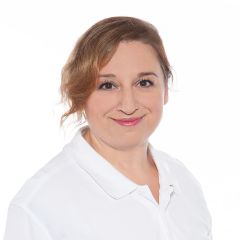
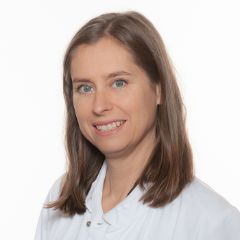
Heart disease during pregnancy
In the consultation hour for heart disease during pregnancy, we advise women with heart disease before and during pregnancy.
Heart disease poses a risk to the mother and child during pregnancy. Heart disease can worsen during pregnancy, many heart medications must not be taken during pregnancy, certain heart diseases require special care during pregnancy (e.g. patients on blood thinners).
It can also happen that a heart disease only occurs during pregnancy and needs to be clarified. Ideally, the mode of delivery and monitoring during and after childbirth must also be adapted to the heart disease.
We work closely with the specialists from the women's clinic and the obstetric anesthesia department to ensure optimal interdisciplinary care.
Consultations take place on Tuesdays and by special arrangement.
Clinic 2
Cardiology, 1st floor
Petersgraben 4
4031 Basel
Tel. +41 61 265 44 45
Fax. +41 61 265 45 98
Patients will receive details of where they can register together with the invitation. You will be asked to bring your documents with you. The medication card in particular is very important to us.

Consultation hours for hereditary cardiomyopathies and ion channel diseases
Consultation for patients with rare, possibly genetic cardiomyopathies and cardiac arrhythmias, as well as their family members. The abbreviation HALB stands for hypertrophic and arrhythmogenic cardiomyopathies, long QT and Brugada syndromes. The consultation is carried out in cooperation between the Cardiology Department and the Medical Polyclinic.
We offer diagnostics including family clarification and medical/cardiological care for suspected or confirmed diagnoses of rare heart diseases.
You will receive a request from us for consultation appointments and, if necessary, diagnostics such as ECG, signal-averaged ECG, long-term ECG, echocardiography and/or stress tests. If necessary, we will discuss further examinations with you during the consultation. You will receive a questionnaire about illnesses in your family together with the request, as some of these illnesses may occur more frequently in the family. Please bring any documents from previous heart examinations with you.
The consultation takes place on Thursday afternoons and by special arrangement.
Clinic 2
Medical outpatient clinic on the ground floor
Petersgraben 4
4031 Basel
anmeldung.kaim@usb.ch
Phone +41 61 265 50 05
Fax. +41 61 265 55 15
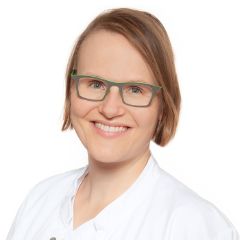

Aortic diseases / Marfan consultation
The Marfan consultation takes place on Tuesdays. On referral by the family doctor or cardiologist, patients with a family history of hereditary connective tissue weakness are assessed. This assessment usually consists of an assessment of the patient's medical history, a clinical examination and a cardiac ultrasound performed on the same day. If necessary, additional examinations, including any genetic tests, are carried out in consultation with specialists.
We prepare a report for the GP, the referring doctor and other doctors involved. The patient also receives a copy of the report.
Clinic 2
Cardiology, 1st floor
Petersgraben 4
4031 Basel
Tel. +41 61 265 44 44
Fax. +41 61 265 55 75


Herzinsuffizienzchirurgie (Herzunterstützungssysteme, “Kunstherz”)
Eine bevorstehende Herzoperation stellt für viele Patienten einen wesentlichen Einschnitt in das bisherige Leben dar.
Zentraler Baustein am Beginn der chirurgischen Behandlungskette ist deshalb eine kompetente und einfühlsame Aufklärung. Sie dient gleichsam der Herstellung eines Vertrauensverhältnisses zwischen Patient*in und Ärztin oder Arzt, als auch dem Abbau von Ängsten und Bedenken.
Sprechstunde für strukturelle Herzerkrankungen (Klappensprechstunde)
Unsere Sprechstunde für strukturelle Herzerkrankugne bzw. Klappensprechstunde findet jeweils Mittwoch Vormittags statt.
Die Zuweisung kann durch Kardiolog*innen, Internist*innen und Hausärzt*innen erfolgen. Die interdisziplinäre Sprechstunde welche durch die Kardiologie und Herzchirurgie gemeinsam betreut wird bietet Patient*innen und ihren Angehörigen die Besprechung und Abklärung von allen Herzklappenerkrankungen und anderen strukturellen Herzerkrankungen. Darunter fallen folgende Krankheitsbilder:
- Aortenklappenstenose/-insuffizienz
- Mitralklappeninsuffizienz/-stenose
- Pulmonalklappenstenose/-insuffizienz
- Trikuspidalklappenstenose/-insuffizienz
- Persistierendes Foramen ovale (PFO)
- Vorhofseptumdefekt (ASD)
- Ventrikelseptumdefekt (VSD)
- Erneute Stenose oder Insuffizienz nach Klappenersatz
- Paravalvuläre Insuffizienzen nach Klappenersatz
Die Sprechstunde dient zur Besprechung möglicher Therapieoptionen und Aufklärung aller struktureller Behandlungen.
Dies kann bei Bedarf interdisziplinär im Beisein eines Herzchirurgen und Kardiologen erfolgen. Eine Vorstellung zur Zweitmeinung, Aufklärung vor geplantem Eingriff oder zur Mitbeurteilung bei komplexen Krankheitsbildern ist möglich. Wir bieten auch regelmäßige Nachsorge-Untersuchungen an, um den klinischen Erfolg der Behandlung sowie die Funktion der korrigierten oder ersetzten Herzklappe bzw. anderer Devices zu überwachen und die weitere Behandlung mit den niedergelassenen KollegInnen abzustimmen.
Wir erstellen einen Bericht zu Handen des Hausarztes/der Hausärztin, des Zuweisenden und weiterer zuständiger Ärztinnen und Ärzte. Patient*innen erhalten stets eine Kopie des Berichtes.
Ort
Klinikum 2
Medizinische Poliklinik im EG
Petersgraben 4
4031 Basel
Kunstherzsprechstunde
Nach der Implantation eines Kunstherzens (VAD) werden die Patientinnen und Patienten durch unsere VAD-Koordination in der eigenen Sprechstunde regelmässig betreut.

Simon Scheifele
Stv. Leiter Kardiotechnik / VAD-Koordinator

Thomas Pfeiffer, Dipl.-Ing. (FH), ECCP
Kardiotechniker / VAD Koordinator
Minimal-invasive Klappenchirurgie
Eine bevorstehende Herzoperation stellt für viele Patientinnen und Patienten einen wesentlichen Einschnitt in das bisherige Leben dar.
Zentraler Baustein am Beginn der chirurgischen Behandlungskette ist deshalb eine kompetente und einfühlsame Aufklärung. Sie dient gleichsam der Herstellung eines Vertrauensverhältnisses zwischen Patient*in und Ärztin oder Arzt, als auch dem Abbau von Ängsten und Bedenken.
Präoperative Sprechstunde (täglich, Termin nach Vereinbarung)
Eine bevorstehende Herzoperation stellt für viele Patientinnen und Patienten einen wesentlichen Einschnitt in das bisherige Leben dar. Zentraler Baustein am Beginn der chirurgischen Behandlungskette ist deshalb eine kompetente und einfühlsame Aufklärung. Sie dient gleichsam der Herstellung eines Vertrauensverhältnisses zwischen Patient*in und Ärztin oder Arzt, als auch dem Abbau von Ängsten und Bedenken.
In der Präoperativen Sprechstunde beraten wir unsere Patient*innen und erklären den Eingriff und den Operationsablauf. Diese Sprechstunde wird durch das persönliche Gespräch mit der Operateurin, dem Operatuer am Aufnahmetag ergänzt. Im Anschluss an die herzchirurgische Sprechstunde haben unsere Patient*innen Gelegenheit, die Präoperative Anästhesiologische Sprechstunde („PAS“) aufzusuchen.
Spezialsprechstunde Aortenerkrankungen
Eine bevorstehende Herzoperation stellt für viele Patient*innen einen wesentlichen Einschnitt in das bisherige Leben dar. Zentraler Baustein am Beginn der chirurgischen Behandlungskette ist deshalb eine kompetente und einfühlsame Aufklärung. Sie dient gleichsam der Herstellung eines Vertrauensverhältnisses zwischen Patient*in und Ärztin oder Arzt, als auch dem Abbau von Ängsten und Bedenken.
Als forschendes Universitäres Schwerpunktzentrum für Erkrankungen der thorakalen Aorta ist die Beratung und Befundkontrolle nach Aortenoperationen wichtiger Bestandteil des Behandlungskonzeptes. Wir legen grossen Wert auf die partnerschaftliche Einbindung zuweisender Hausärzt*innen und Kardiolog*innen, die zeitnah informiert werden.
Schwerpunkte der Aortensprechstunde sind Betreuung und Kontrolle nach operativem Aortenersatz elektiv oder in Folge akuter Dissektionen („6-Monats-Kontrolle“) aber auch Beratung bei angeborenen Aortenwanderkrankungen oder asymptomatischen Aortenerweiterungen zur Einholung einer Zweitmeinung.
Aortentelefon: +41 61 265 71 46
